
Mario Fortino Alfonso Moreno Reyes, known by the stage name Cantinflas, was a Mexican comedian, actor, and filmmaker. He is considered to have been the most widely-accomplished Mexican comedian and is celebrated throughout Latin America and in Spain as a popular icon. His humor, loaded with Mexican linguistic features of intonation, vocabulary, and syntax, is beloved in all the Spanish-speaking countries of Latin America and in Spain and has given rise to a range of expressions including cantinflear, cantinflada, cantinflesco, and cantinflero.

Nicolai Poliakoff OBE was the creator of Coco the Clown, arguably the most famous clown in the United Kingdom in the mid-20th century.
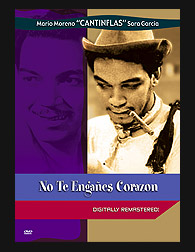
Don't Fool Yourself Dear is a 1937 Mexican comedy-drama film directed by Miguel Contreras Torres and starring Carlos Orellana. It is the first full-feature film of Mexican comedian Cantinflas after becoming a star of the carpa circuit. It was also one of the earliest films of Orellana and Sara García and the first where they share the screen.
The Golden Age of Mexican cinema is a period in the history of the Cinema of Mexico between 1930 and 1969 when the Mexican film industry reached high levels of production, quality and economic success of its films, besides having gained recognition internationally.
In Mexico and the Southwestern United States, the carpa theater flourished during the 1920s and 1930s. Like its American counterpart vaudeville, performance materials were varied, including comedic sketches, puppet shows, political satire, acrobatics, and dance.
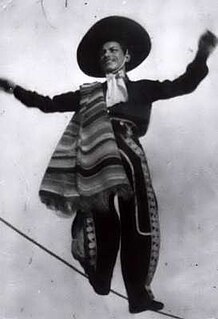
La Carpa García, known in English as the García Brothers Show, was a Mexican American carpa that was active from 1914 – 1947. Carpa García consisted of performers from several families, including Manuel V. and Teresa García, Manolo and Florinda García, Raymond and Virginia García, Rodolfo García, Consuelo and Pilár García, Esther García Robinson, Esperanza,, and Aida García Castro and husband, Alfredo. Teresa García also had three talented children, Rafael, Juan, and Gilberta, from her previous marriage.
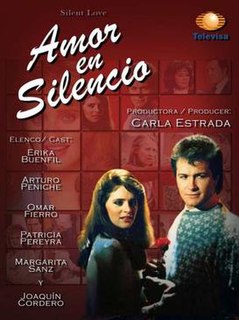
Amor en silencio is a Mexican telenovela produced by Carla Estrada for Televisa in 1988. Its first broadcast was in Mexico in 1988 and then made its debut in Latin America, Europe, Asia and, in a unique situation, it was broadcast in the United States by Telemundo during primetime. It can be said that this is the only Televisa telenovela that was never shown on Univision. Back then Telemundo got the rights to Amor en silencio and Pasión y poder, the latter one got picked up by Univision in 1993 as daytime programming.
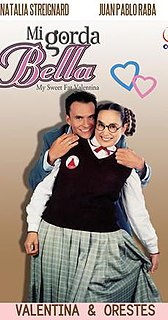
Mi Gorda Bella is a Venezuelan telenovela created by Carolina Espada and produced by Radio Caracas Televisión in 2002. This telenovela lasted 178 episodes and was distributed internationally by RCTV International.
Estanislao Schillinsky Bachanska, known as Estanislao Shilinsky or simply Shilinsky, was a Lithuanian-born Mexican comedian and the half of the 1940–1970 comedy duo Manolín y Shilinsky with Manuel Palacios ("Manolín").
Valentina Ivanova is a retired female discus thrower from Russia, who competed in the discus contest at the 1996 Summer Olympics in Atlanta, Georgia. There she ended up in 24th place. Ivanova set her personal best in the women's discus throw event on 2001-01-27 in Pietersburg.

Camaleones (Chameleons) is a 2009/2010 Mexican neo-noir vigilante heist thriller telenovela produced by Televisa. The soap opera premiered on Mexico's Canal de las Estrellas, replacing the completed TV series Verano de Amor. Camaleones is produced by Rosy Ocampo, who has produced several popular telenovelas, such as Amor sin Maquillaje, Las Tontas No Van al Cielo and La Fea Mas Bella. Filming took place in Mexico City and Xochitepec in June 2009, and lasted approximately 7 months. The telenovela premiered on Univision in the United States on May 4, 2010.
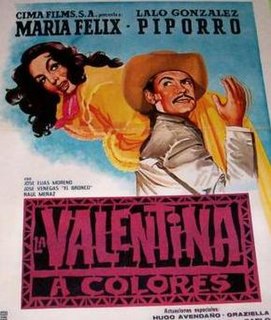
La Valentina is a 1966 Mexican romantic comedy film directed by Rogelio A. González, produced by Gregorio Walerstein, and starring María Félix and Eulalio González in the leading roles. The supporting cast features José Elías Moreno, José Venegas, and Raúl Meraz. The film is a dramatization of the Mexican Revolution corrido of the same name.

The Russian Concubine is a 2007 novel by Kate Furnivall. The book is loosely based on the story of Furnivall's mother Lily, who was a Russian refugee. Set in Russia and China, it is a love story between Lydia Ivanova and Chang An Lo and is followed by a sequel The Concubine's Secret and a prequel The Jewel of St Petersburg, which is about Lydia's parents Valentina and Jens.

The Concubine's Secret, as known as The Girl from Junchow in USA, is a 2009 novel by Kate Furnivall; it is the sequel to The Russian Concubine. It followed by journey of Lydia Ivanova and Chang An Lo, whose separation lives when she searched for her father along with her half-brother and Chang is a high-ranking officer.

The Jewel of St Petersburg is a 2010 prequel to The Russian Concubine and The Concubine's Secret by Kate Furnivall. It is about Lydia Ivanova Friss's parents Valentina Ivanova and Jens Friss love, set against the backdrop of Russia.
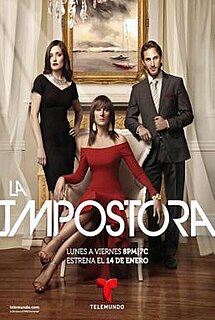
La impostora, is a Spanish-language telenovela produced by United States-based television network Telemundo Studios, Miami. It is based on the Chilean telenovela Cerro Alegre, produced by Canal 13 in 1999. It stars Lisette Morelos, Sebastián Zurita and Christian Bach, together with Manuel Landeta, Begoña Narváez, Mauricio Hénao, Jonathan Islas and Alpha Acosta.

Mikhail Sariotti Сариотти; 1839, near of Vyborg - 30 January 1878, Saint Petersburg) was a famous Russian opera singer (bass-baritone) and music critic.

A que no me dejas, formerly known as A que no me dejas, corazón, is a Mexican telenovela produced by Carlos Moreno for Televisa. It is a remake of the Mexican telenovela Amor en silencio, produced in 1988.
Marina Herrera Aragón, known as Marilú or "La Muñequita que Canta", is a Mexican singer and actress. She began her career more in 1939.She is from the last stars from the Golden Age of Mexican cinema.

Step Forward is a Soviet film-an almanac, consisting of five novels.













